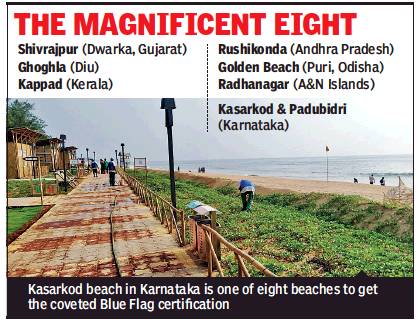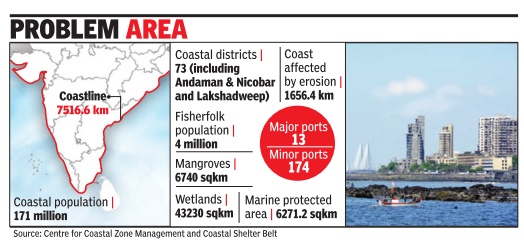Coastline, beaches: India
| Line 9: | Line 9: | ||
=Beaches= | =Beaches= | ||
| − | =Blue Flag’ certification= | + | ==Blue Flag’ certification== |
| − | ==2020== | + | ===2020=== |
[https://epaper.timesgroup.com/Olive/ODN/TimesOfIndia/shared/ShowArticle.aspx?doc=TOIDEL%2F2020%2F10%2F12&entity=Ar00803&sk=7BFEDD75&mode=text Vishwa Mohan, October 12, 2020: ''The Times of India''] | [https://epaper.timesgroup.com/Olive/ODN/TimesOfIndia/shared/ShowArticle.aspx?doc=TOIDEL%2F2020%2F10%2F12&entity=Ar00803&sk=7BFEDD75&mode=text Vishwa Mohan, October 12, 2020: ''The Times of India''] | ||
| Line 18: | Line 18: | ||
The beaches which have got the tag are Shivrajpur (Dwarka, Gujarat), Ghoghla (Diu), Kasarkod and Padubidri (Karnataka), Kappad (Kerala), Rushikonda (Andhra Pradesh), Golden Beach (Puri, Odisha) and Radhanagar (Andaman & Nicobar Islands). | The beaches which have got the tag are Shivrajpur (Dwarka, Gujarat), Ghoghla (Diu), Kasarkod and Padubidri (Karnataka), Kappad (Kerala), Rushikonda (Andhra Pradesh), Golden Beach (Puri, Odisha) and Radhanagar (Andaman & Nicobar Islands). | ||
| + | |||
Blue Flag beaches are considered the world’s cleanest beaches. In order to qualify, 33 stringent criteria relating to environmental, bathing water quality, educational, safety, services and accessibility standards must be met by the beaches. | Blue Flag beaches are considered the world’s cleanest beaches. In order to qualify, 33 stringent criteria relating to environmental, bathing water quality, educational, safety, services and accessibility standards must be met by the beaches. | ||
| + | |||
“It is an outstanding feat considering that no ‘Blue Flag’ nation has ever been awarded for eight beaches in a single attempt,” said Union environment minister Prakash Javadekar while announcing the decision of the international jury. | “It is an outstanding feat considering that no ‘Blue Flag’ nation has ever been awarded for eight beaches in a single attempt,” said Union environment minister Prakash Javadekar while announcing the decision of the international jury. | ||
He said, “This is also a global recognition of India’s conservation and sustainable development efforts… India is also the first country in the Asia-Pacific region which has achieved this feat in just about two years’ time.” | He said, “This is also a global recognition of India’s conservation and sustainable development efforts… India is also the first country in the Asia-Pacific region which has achieved this feat in just about two years’ time.” | ||
| + | |||
Union environment ministry had last month sent the list of these eight beaches to the international jury, seeking Blue Flag certification which is accorded by the Foundation for Environmental Education (FEE), headquartered in Copenhagen, Denmark. The jury, which takes a final call on this certification, comprises eminent members from the UN Environment Programme, World Tourism Organisation, FEE and IUCN. | Union environment ministry had last month sent the list of these eight beaches to the international jury, seeking Blue Flag certification which is accorded by the Foundation for Environmental Education (FEE), headquartered in Copenhagen, Denmark. The jury, which takes a final call on this certification, comprises eminent members from the UN Environment Programme, World Tourism Organisation, FEE and IUCN. | ||
| + | |||
Over 4,600 beaches, marinas and boats from around 50 countries have, so far, got the Blue Flag certification. Spain has the highest number of Blue Flag tagged sites. India, which started working on getting the tag in 2018, has plans to expand the network of Blue Flag certification to 100 such beaches in the country in the next five years. | Over 4,600 beaches, marinas and boats from around 50 countries have, so far, got the Blue Flag certification. Spain has the highest number of Blue Flag tagged sites. India, which started working on getting the tag in 2018, has plans to expand the network of Blue Flag certification to 100 such beaches in the country in the next five years. | ||
| + | |||
In order to achieve this goal, the environment ministry had last month launched India’s own eco-label “BEAMS” (Beach Environment & Aesthetics Management Services) under its Integrated Coastal Zone Management (ICZM) project. | In order to achieve this goal, the environment ministry had last month launched India’s own eco-label “BEAMS” (Beach Environment & Aesthetics Management Services) under its Integrated Coastal Zone Management (ICZM) project. | ||
Besides the Blue Flag tag for its eight beaches, India has also been awarded a third prize by the jury under the “International Best Practices” for pollution control in coastal regions. The certification is considered important for tourism as this tag attracts both domestic and international tourists to these beaches. | Besides the Blue Flag tag for its eight beaches, India has also been awarded a third prize by the jury under the “International Best Practices” for pollution control in coastal regions. The certification is considered important for tourism as this tag attracts both domestic and international tourists to these beaches. | ||
| − | |||
| − | |||
| Line 63: | Line 66: | ||
COASTLINE, BEACHES: INDIA]] | COASTLINE, BEACHES: INDIA]] | ||
[[Category:India|C | [[Category:India|C | ||
| + | COASTLINE, BEACHES: INDIA]] | ||
| + | |||
| + | [[Category:Economy-Industry-Resources|C COASTLINE, BEACHES: INDIA | ||
| + | COASTLINE, BEACHES: INDIA]] | ||
| + | [[Category:India|C COASTLINE, BEACHES: INDIA | ||
COASTLINE, BEACHES: INDIA]] | COASTLINE, BEACHES: INDIA]] | ||
Revision as of 21:27, 13 October 2020
This is a collection of articles archived for the excellence of their content. |
Contents |
Beaches
Blue Flag’ certification
2020
Vishwa Mohan, October 12, 2020: The Times of India

From: Vishwa Mohan, October 12, 2020: The Times of India
Eight Indian beaches have got the coveted ‘Blue Flag’ certification — an international ecolevel tag which is one of the world’s most recognised awards for clean, safe and environment-friendly beaches, marinas and sustainable boating tourism operators.
The beaches which have got the tag are Shivrajpur (Dwarka, Gujarat), Ghoghla (Diu), Kasarkod and Padubidri (Karnataka), Kappad (Kerala), Rushikonda (Andhra Pradesh), Golden Beach (Puri, Odisha) and Radhanagar (Andaman & Nicobar Islands).
Blue Flag beaches are considered the world’s cleanest beaches. In order to qualify, 33 stringent criteria relating to environmental, bathing water quality, educational, safety, services and accessibility standards must be met by the beaches.
“It is an outstanding feat considering that no ‘Blue Flag’ nation has ever been awarded for eight beaches in a single attempt,” said Union environment minister Prakash Javadekar while announcing the decision of the international jury. He said, “This is also a global recognition of India’s conservation and sustainable development efforts… India is also the first country in the Asia-Pacific region which has achieved this feat in just about two years’ time.”
Union environment ministry had last month sent the list of these eight beaches to the international jury, seeking Blue Flag certification which is accorded by the Foundation for Environmental Education (FEE), headquartered in Copenhagen, Denmark. The jury, which takes a final call on this certification, comprises eminent members from the UN Environment Programme, World Tourism Organisation, FEE and IUCN.
Over 4,600 beaches, marinas and boats from around 50 countries have, so far, got the Blue Flag certification. Spain has the highest number of Blue Flag tagged sites. India, which started working on getting the tag in 2018, has plans to expand the network of Blue Flag certification to 100 such beaches in the country in the next five years.
In order to achieve this goal, the environment ministry had last month launched India’s own eco-label “BEAMS” (Beach Environment & Aesthetics Management Services) under its Integrated Coastal Zone Management (ICZM) project. Besides the Blue Flag tag for its eight beaches, India has also been awarded a third prize by the jury under the “International Best Practices” for pollution control in coastal regions. The certification is considered important for tourism as this tag attracts both domestic and international tourists to these beaches.
Indian coastline under threat
The Times of India, Aug 05 2015

Subodh Varma
Cash-strapped authorities put coastline under threat
Construction, erosion top worries: Panel
India's 7500 km long coast line, home to over 171 mil lion people, is under threat and the government machinery meant to manage it is in disarray . The coastal zone management authorities (CZMA 's) at the national and state level are orphaned bodies with no financial support, except what they raise by charging fees from those wanting project clearance. They are packed with ex-officio bureaucrats from various departments with limited expertise.Their meetings are spent in discussing project applications. They clear 80% of projects but never go back to monitor or check violations. They don't have maps with requisite details. They have not even marked out the high tide line. These are the shocking findings of a report prepared by a group of environmental activists cum experts from the Centre for Policy Research, New Delhi and the Namati Environmental Justice Program. The authors interviewed sitting and ex-members of the CZMAs, analysed minutes of 350 meetings of the CZMAs and looked at high court and National Green Tribunal cases over the years.
By a 1991 government notification, the coast is divided into four zones -one stretches over the water while three stretch landwards going up to 500 meters from high tide level. Multiple, contesting us es are vying for a piece of the coastindustries, real estate, tourism, livelihoods, mining and conservation, says Meenakshi Kapoor, one of the researchers.
“There are threats from unregulated construction, discharge of untreated effluents and sewage, destruction of mangroves, deterioration of critical ecosystems such as estuaries, saltpans, coral reefs, etc and coastal erosion,“ she said.
In most coastal Indian cities, poorer sections are forced to live in slums on the coast. Municipal authorities allow destruction of natural drainage and wetlands, as in Mumbai, causing flooding.Over 90% of sewage pouring into the sea from 87 big cities is untreated.
It was to regulate and monitor these threats that the coastal zones were notified and CZMAs were set up. On paper there are strict rules about where you can build a hotel or an ice factory , and where you can have fish processing units or net mending yards. And, the CZMAs are supposed to keep a tight watch. But the reality is reverse.
The report narrates in harrowing detail their analysis of 350 meeting minutes of national and state CZMAs. The NCZMA discussed 157 agenda items between 2003 and 2013 of which 73 related to reclassifying a piece of the coast so that it can be used differently . Just 12 cases of violations and just one case of reviewing what the state CZMAs were doing was discussed.
The state CZMAs were initially given Rs 5 lakh each by the central environment ministry . After that they have been left to their own de vices till 2011 when state governments were asked to fund them. Meanwhile each state CZMA has hammered out its own way of raising funds.
In Goa, if you want to set up a commercial institution, you apply to the Goa CZMA and pay Rs 10,000 fees. For setting up anything worth upto Rs 5 crore, you pay processing fees of Rs 25,000 in Gujarat, Rs 1 lakh in Maharashtra or just Rs 10,000 in West Bengal. Since the money is coming from project proposals, maximum time is spent by the state bodies discussing them. In Kerala, Karnataka, Maharashtra and Odisha, over 90% of the agenda items were project proposals.
In other states, this frequency was between 60 to 80%, with only Goa having 46% frequency , according to analysis of meeting minutes between 2010 and 2013.
The report recommends an overhaul with better definition of roles and powers, more resources, participatory planning, bringing in transparency , and improving monitoring and compliance. Otherwise, this bureaucratic mess will be unable to save India's coasts.